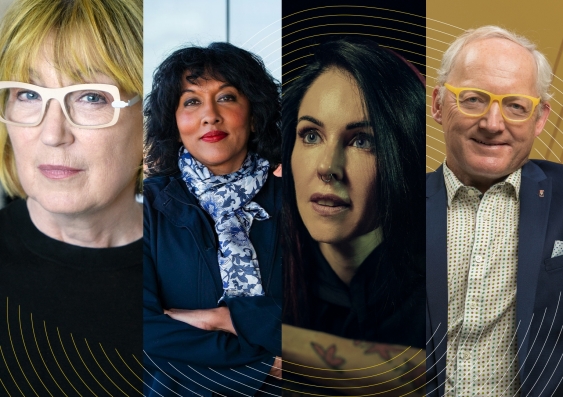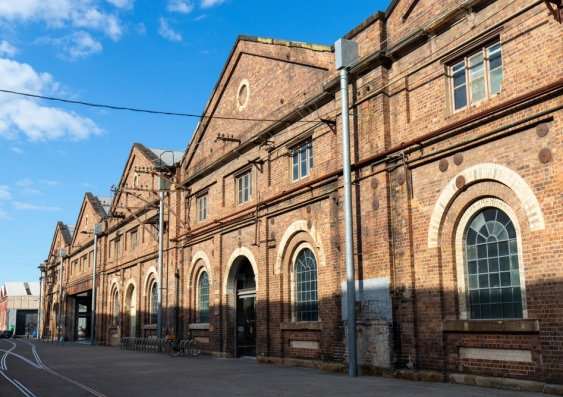Switching off from our modern, connected lives
2023-05-26T17:03:00+10:00

Photo: Maria Boyadgis
Author and artist Jenny Odell talks about a world obsessed with productivity and the value of being alone with one’s thoughts.
How to reclaim our attention from a world preoccupied by our productivity was the topic of conversation led by author Jenny Odell at a Sydney Writers’ Festival event held at UNSW Sydney on Wednesday evening.
Ms Odell, author of How to Do Nothing: Resisting the Attention Economy, spoke of how reconnecting with our physical environment is possibly the best form of resistance from our modern world driven by technology and profits.
Referring to her book, Ms Odell said: “It’s obviously not a book about literally doing nothing, it’s doing nothing from the point of view that sees productivity in a very narrow and specific way. Resisting the attention economy in my book basically means resisting by changing that frame of reference.”
Drawing inspiration from the old redwoods and a rose garden five minutes from her hometown of Oakland, California, Ms Odell said focusing our attention on our natural surroundings is a strategy to switch off and bring back a “slowness to everyday attention”.
What is the attention economy?
Ms Odell perceives the attention economy as being where time is money, and you should have something to show for your time – either getting work done, or self-improvement.
“I think part of starting to see outside the attention economy is the simple recognition of seeing that it is designed for profit. Things like advertising and social media… are designed specifically to encourage and make use of a short attention span,” she said.
“It's good for the bottom line if you’re distractedly scrolling all of the time and not ever quite finding what you really want.”
Ms Odell refers to ‘algorithmic honing-in’ as when your recommended algorithms are shunting you into the most boring and static version of yourself.
She said the idea of a personal brand can create a sense of alienation and hyper-individualism and encourages us to think about how the platforms in the attention economy change or affect the way we think about ourselves.
Paths of resistance
Ms Odell recommends several paths of resistance to our profit-driven tech society.
She is a supporter of artworks in natural surroundings that allow you to switch off and pay attention in a certain way.
‘Applause Encouraged’ by Scott Polach is one such example. It was an event arranged where people came in to a sectioned off area on a clifftop, were encouraged not to use their phones, watched the sunset, applauded, and then refreshments were served.
“It’s an example of a structure made by the artist in order to make something already there, the sunset, more palpable,” she said.
Birdwatching and becoming aware of one’s bioregion, where we live, are other examples of deep noticing in our natural environment which are favourite pastimes of Ms Odell.
She said every moment deserves our full attention, and with practice, we can achieve it.
Ms Odell offers a fresh perspective and critique of our modern world driven by technology and profits: “When I think about resisting the attention economy, what I imagine is a restoration of context, complexity, flourishing, dense webs of connection, everything that has been stripped away by a very narrow way of thinking about ourselves and our relationships to each other.”
Engaging with technology
Following her talk, Ms Odell was joined by UNSW Scientia Professor Toby Walsh and Crikey journalist Cam Wilson for a wide-ranging discussion on our engagement with technology, facilitated by technology journalist Ariel Bogle.
In our new world of Artificial Intelligence (AI), Prof. Walsh spoke of how a fake photo of an explosion at the Pentagon recently moved the stock market. He warned: “Unless you were physically in the room and saw it with your own eyes and heard it with your own ears, you have to entertain the idea that … it may be made up or not real.”
In terms of regulating AI, Prof. Walsh said the need to do so is very clear: “It’s going to steal our attention; it’s going to blur the distinction between true and false, it’s going to pervert the course of our democracy. How much clearer does it have to be?”
“We should have learnt the lesson from social media. That was the first example of how it can go wrong, we’re going to repeat the same again if we’re not careful.”
Prof. Walsh said we will look back in 10- or 20-years’ time on social media like we currently look at tobacco or alcohol: “We don’t let young minds that are still being formed be exposed to it because it is so easy [to be led into] ways that are harmful.”
Mr Wilson recalled a recent controversy where Google published an advertisement showing someone using YouTube, but the computer they were using showed that they had an advertisement blocker, which is Google’s business.
He used it as an example of how some people are taking a step back from technology and taking steps to distance themselves from society. He said there is the potential for class divide that may increase with AI.
When asked a question about using leisure time to improve ourselves, thereby being productive in the sense of the attention economy, Ms Odell referenced philosopher Martin Buber’s two distinct ways of how we relate to each other: I-Thou and I-It.
In the I-Thou encounter, we relate to each other as authentic beings, without judgment. The I-It encounter is the opposite in that we relate to another as object, and Ms Odell said social media runs on this belief.
She said we need to render ourselves open to encounters and surprise, which addresses the issue of using leisure time to be productive.
About the presenters
Jenny Odell is the author of How to Do Nothing: Resisting the Attention Economy and Saving Time: Discovering a Life Beyond the Clock. She is also an interdisciplinary artist and has been in residence at the San Francisco Planning Department, Recology SF (otherwise known as the dump), and the Internet Archive. Odell taught digital art at Stanford University from 2013 to 2021. An enthusiast of birding, geology, and local history, she is based in Oakland, California.
Toby Walsh is Chief Scientist of UNSW's new AI Institute. He is a strong advocate for limits to ensure AI improves our lives, having spoken at the UN, and to heads of state, parliamentary bodies, company boards and many others on this topic. This advocacy has led to him being ‘banned indefinitely’ from Russia. He was named on the international ‘Who's Who in AI’ list of influencers. His most recent book is Machines Behaving Badly: the morality of AI.
Cam Wilson is associate editor at Crikey where he covers various current affairs issues in Australia. He was previously a journalist at ABC, Buzzfeed, and with the Pedestrian Group as reporter for Business Insider and Gizmodo.
Ariel Bogle is a technology reporter with the ABC. She has won various awards for her work, including for a three-part radio series on health misinformation. Her reporting has been published in The New York Times, The Guardian, The Atlantic and The Australian Financial Review, among other places.



